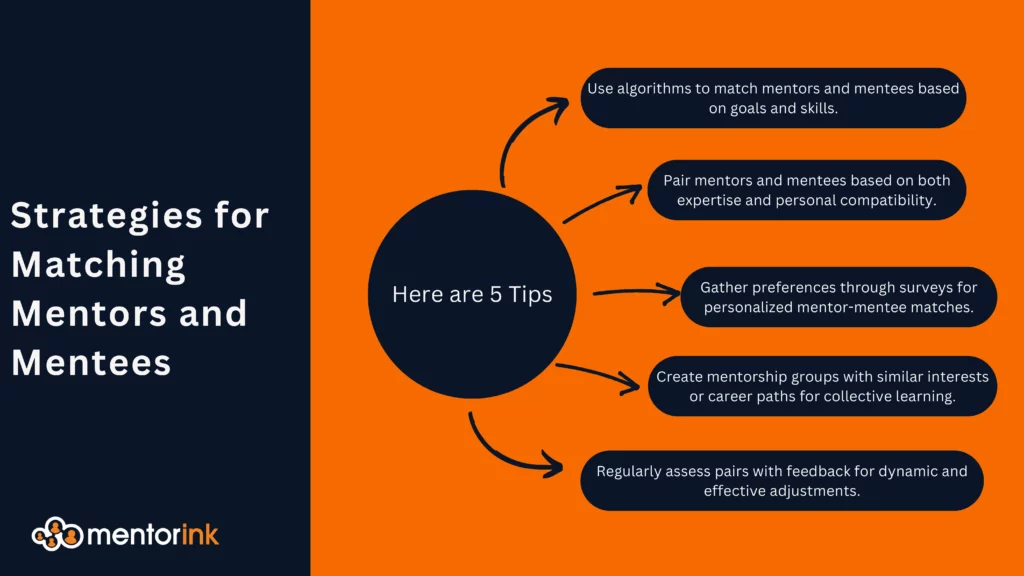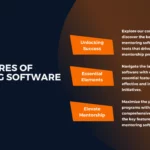
In today’s fast-paced professional environment, the art of mentorship has emerged as a critical component for career advancement and personal improvement. Mentor matching, an essential element of professional mentoring programs, has a significant impact on the futures of both mentors and mentees.
This strategy entails carefully matching experienced experts with persons seeking help, with the goal of fostering a mutually beneficial connection. Mentor matching provides mentees with essential insights, expertise, and confidence to navigate their professional pathways, while mentors enjoy the satisfaction of sharing wisdom and helping to the growth of future leaders.
The importance of mentor matching cannot be emphasized. It is more than just connecting individuals; it is also about combining ambitions, experiences, and personalities to create a strong catalyst for professional and personal development.
What is Mentor and Mentee Matching?
Mentor and mentee matching is an important component of professional mentoring programs, meant to connect individuals desiring direction and growth (mentees) with experienced professionals (mentors) ready to offer their expertise and insights.
This matching process seeks to establish relationships that are mutually beneficial that assist the mentee’s professional and personal development, while also allowing mentors to give back, improve their leadership abilities, and discover new views. Effective mentor-mentee matching extends beyond only professional alignments; it also considers personality, career aspirations, learning styles, and expectations from the mentorship experience.
The ultimate objective is to lay the groundwork for a successful and fulfilling mentorship relationship that will allow the mentee to develop in their careers, improve their skills, and network, while also giving the mentor a feeling of fulfillment and purpose.
Mentor matching has gotten more complex as technology has advanced, with mentor matching software and algorithms analyzing numerous characteristics to identify the most potential mentor-mentee combinations, enhancing the efficacy and impact of mentorship programs in professional contexts.
Which Employees Should Be Matched with a Mentor?
Determining whether employees should be paired with a mentor requires careful assessment of both the possible mentees’ and mentors’ preparedness, ambitions, and talents. Mentees are frequently chosen based on their keen interest for personal and professional improvement, receptivity to feedback, and particular career development objectives. For more detailed information on this topic, you can take a look at “How to Engage Employees to Mentoring Programs“.
Mentors, on the other hand, must have not just appropriate experience and expertise, but also the capacity to lead, encourage, and devote time to their mentees’ development. The use of mentor matching software is critical in this process. This program uses data analytics and advanced algorithms to analyze compatibility based on variables such as talents, experience, industry, and even personality traits.
This guarantees that the match is not only beneficial professionally, but also favorable to establishing rapport and cultivating a fruitful mentor-mentee relationship. Thus, mentor matching software is essential for discovering possible partners, streamlining the matching process, and boosting the possibility of effective mentoring results. For further details, you can read our blog post Which employees should be matched with a mentor?
Five Well-known Strategies for Mentor-Mentee Matching
The matching of mentors and mentees is critical to the success of mentoring programs. Here are five well-known ways to improve the efficacy of these matches:
- Compatibility-Based Matching: This technique matches mentors and mentees based on their personality attributes, learning styles, and interpersonal compatibility. The notion is that a strong personal connection promotes open communication and trust, making mentoring more successful. To help with this approach, mentor matching software frequently incorporates personality evaluations.
- Talents and Goals Alignment: Another effective technique is to match mentors and mentees based on their professional talents and career aspirations. This technique guarantees that the mentee is partnered with a mentor who has the knowledge and competence to help them achieve their professional goals. Matching engines use profile data to identify matches with similar professional goals and skills.
- Cross-functional Matching: Matching mentees with mentors from other departments or functional areas of the organization can promote creativity, innovation, and a deeper knowledge of the business. This technique allows mentees to venture outside of their comfort zones and get insights into many sectors of the company, increasing their professional growth.
- Peer Mentorship: Unlike conventional mentorship, which connects seniors and juniors, peer mentoring pairs persons at comparable career phases who have complimentary abilities or experiences. This technique can help peers traverse their career trajectories together, allowing for mutual learning and support. Peer mentoring can help to find suitable peer mentors by comparing their career phases and skill sets.
- Reverse Mentoring: In reverse mentoring, typical roles are reversed, with younger or less experienced personnel coaching more senior staff on technology, social media, and current trends. This method recognizes the importance of multiple viewpoints and encourages a culture of continual learning. Mentor matching software makes reverse mentoring easier by detecting skill and knowledge gaps that younger employees can fill.
Steps for Mentor and Mentee Matching
The task of organizing both mentors and mentees is a complex undertaking that necessitates technological assistance and a deliberate strategy to guarantee compatibility and the possibility of a productive mentoring partnership. Detailed descriptions of the procedures involved follow:
- Identification of Mentoring Goals: The first stage is for both potential mentors and mentees to define their mentorship program objectives. Mentees may want career advice, skill development, or networking opportunities, whereas mentors may want to share their expertise, improve their leadership skills, or give back to their professional community. Clear goals assist in developing purpose-driven matches.
- Profile Development and Evaluation: The mentor matching program allows mentors and mentees to construct complete profiles that showcase their professional backgrounds, talents, hobbies, and mentoring aspirations. This data serves as the foundation for the matching process, allowing the matching engine to locate suitable partners with similar aims and complimentary talents.
- Matching Parameters Setup: The mentor matching engine enables enterprises to define particular match criteria, such as industry experience, professional capabilities, individual hobbies, and even preferred mentoring methods. This flexibility guarantees that matches are made not just based on professional alignment, but also on personal compatibility, boosting the likelihood of a successful mentoring.
- Algorithmic Matching Process: Using complex algorithms, the mentor matching program evaluates profiles and criteria to recommend the best mentor-mentee matches. This technology-driven strategy eliminates prejudice and improves matching efficiency, ensuring that pairings have the best chance of forming a successful mentorship connection.
- Selection and Approval: Once prospective matches have been found, mentors and mentees can assess their proposed pairings. They can accept the pairing or ask for a new one if they feel a better alignment is feasible. This phase guarantees that both sides are comfortable and amenable to the match, resulting in a successful start to the mentoring.
- Mentoring Initiation: Once the partners are verified, the mentoring may commence. This usually begins with an introductory meeting to build rapport, discuss goals, and arrange the format of their contacts. Regular check-ins and feedback loops are encouraged for tracking progress and adjusting goals as needed.
- Constant Support and Evaluation: Throughout the mentoring, the organization must give assistance and resources to both mentors and mentees. Regular assessments aid in analyzing the efficacy of the mentoring, ensuring that it continues on track with the original aims, and changing the course as needed.


